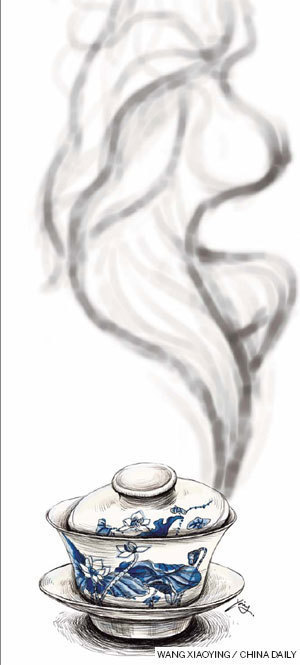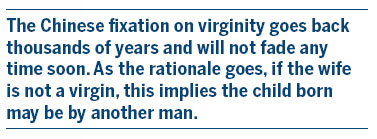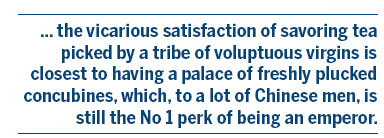


The age-old obsession with virginity is seeing a revival under both moral and commercial pretenses.
Recently, a tea plantation in China put up "help wanted" ads for tea leaf pickers: Female, virgin, with C-cup breasts.
Does this sound like reasonable prerequisites for picking tea leaves? The advertising company said it was to guarantee that the tea leaves, which the virgins were supposed to pick with their mouths and place between their breasts, were of the best quality.
I'm not surprised. I have heard variations of this job description while touring tea plantations around the country. Virginity of the pickers is always touted as a prized quality of the tea with weather conditions and altitude of the tea-growing areas mentioned as added flourishes.
Chinese men's obsession with female virginity has just found a new manifestation as this recruitment effort was obviously a ploy targeting tea drinkers with more active and discriminating sexual fantasies. For them, purity is one thing but the vicarious satisfaction of savoring tea picked by a tribe of voluptuous virgins is closest to having a palace of freshly plucked concubines, which, to a lot of Chinese men, is still the No 1 perk of being an emperor.
It is ironic that Chinese women, at least some of them, share this sentiment. Bo Wanqing, affectionately known as "Auntie Bo" and host of a couple of television shows in Shanghai and also a "people's representative", equivalent to a congresswoman, recently admonished on TV that "Virginity is a girl's most valuable dowry to the family of her mother-in-law".
No wonder I feel I've been transported back 100 years, to the pre-May Fourth Movement (1919) era that marked the dawn of enlightenment for the Chinese people. With the ritual of kowtowing being sporadically revived and glowingly described, albeit not yet in officialdom, and now the embrace of chastity, is foot-binding not far on the horizon?
Unlike the United States, China has not had a sexual revolution. While Americans were celebrating flower power, young Chinese did not dare hold hands with the one they loved. In the puritanical years of the "cultural revolution" (1966-76), if one engaged in premarital sex, he - and especially she - would be branded for life as "morally depraved" and humiliated a la Hester Prynne.
The sexual awakening that has been evolving as a corollary of reform and opening-up has brought a gradual change to social mores in China. But one cannot draw parallels between this renewed emphasis on chastity and some conservative Americans' advocacy of celibacy. Chinese youths are not oversexed per se. On the contrary, proper sex education is not yet available because it violates traditional notions of purity and innocence. There are more tales of newly weds not knowing the birds and the bees than of lust-crazed youths and teen pregnancies.
And the demand for virginity does not apply equally to both sexes as one cannot prove its loss with males. The barometer for female virginity remains simple and is poetically called "dropping red". In folk literature, the breaking of the hymen is lovingly portrayed with imagery of peach blossoms. The groom would proudly show off the kerchief smeared with blots of blood to his parents and guests waiting impatiently outside the bridal chamber on the wedding night. If the parents did not literally see "red" on the cloth, they would see red emotionally or at least be embarrassed.
Women high and low went to great lengths to prevent such an embarrassment. Emperor Han Chengdi (51-7 BC) is known for his debauchery, yet he wanted his phalanx of women lily-white pure. Zhao Feiyan, who later became his favorite concubine, was already experienced in the facts of life when she was selected for the palace. On their first night together, she passed off as a virgin with a little help from porcine blood.
Nowadays medical science has made it possible to repair a broken hymen. And if online search sites are to be believed, there are just as many such services as repairs of damaged flash-memory disks. The fee is around a thousand yuan, which is a pittance compared with the premium for the "breaking virginity" service, i.e. prostitution involving a young woman who can prove she is a virgin.
This has given rise to a flurry of news reports on "virgin hustling" and the over-zealous campaign to crack down on it. In 2009, some Kunming policemen spotted a pair of sisters in a part of town heavily populated by migrants. Overhearing one of them say "Do you want to play", the police deduced there was child prostitution involved and arrested the girls and their parents. The parents said their daughters were still in elementary school, aged 15 and 13 respectively. Under media pressure, the girls were subject to medical examination and found to be virgins, and thus exonerated of the police accusation.
The fact that the girls were underage seemed beside the point as both prosecutors and defenders were relentlessly focused on their virgin status or the possible lack thereof.
The Chinese fixation on virginity goes back thousands of years and will not fade any time soon. As the rationale goes, if the wife is not a virgin, this implies the child born may be by another man. That doubly violates the husband's sense of entitlement, first that the wife is his personal property, and second, the child is a "mole", so to speak, implanted by some other man to inherit what he owns. Many operatic melodramas are built on this male suspicion and a happy ending ensues only when the bride proves her continence.
Another reason is the superstition that copulating with virgins can help with men's longevity, as implied in many ancient sex manuals. Paradoxically, in times of war and conflict, the median age of the population was so low that men's desire for procreation overrode their insistence on the immaculacy of the women they chose as spouses. During sustained periods of peace and prosperity, however, this mentality of bedding virgins was played out in elaborate rituals and artistic sophistication. There were so many euphemisms for the act that it would take a linguist to decipher them all.
This argument also explains why women are subject to such scrutiny while men are almost encouraged to engage in increasingly more eye-popping May-December affairs. Granted, age discrepancy does not automatically translate into virgin mania. But we must remember that in the old days a girl of 13 or 15 was considered ready for marriage.
Against such hoary ideals of feminine virtue, the defense of women's rights seems feeble at best. There is a Qing Dynasty (1644-1911) book that chronicles the story of a 13-year-old girl who was working at the plow and inadvertently broke her hymen. A little while later when she got married, she could not show the "red blots" and was to be banished by her husband. Fortunately, an elderly gentleman had noticed her jumping up and down and kept the plow as evidence. So, he came forward to prove her innocence.
A cynic that I am, I would raise the doubt that the old guy could have been the cause of her "dropping red blotches" ahead of time.
In modern days, educators always cite manual labor or physical exercise to explain the premarital breaking of the hymen. What if someone has had a serious relationship? That probably is still perceived as undesirable and the woman is likely to be cast as loose.
It is not just tea-leaf picking or tea drinking that spurs the imagination of some Chinese men. There are myriad reasons for such mind trips, which are basically a combination of the harem fantasy and the virgin fantasy. As fantasy goes, reality is just an inconvenience.
raymondzhou@chinadaily.com.cn
相關(guān)閱讀:
What's love got to do with it?
Something's funny about the bunny
Highs and lows of a storied past
(作者周黎明 中國日報(bào)網(wǎng)英語點(diǎn)津 編輯陳丹妮)
